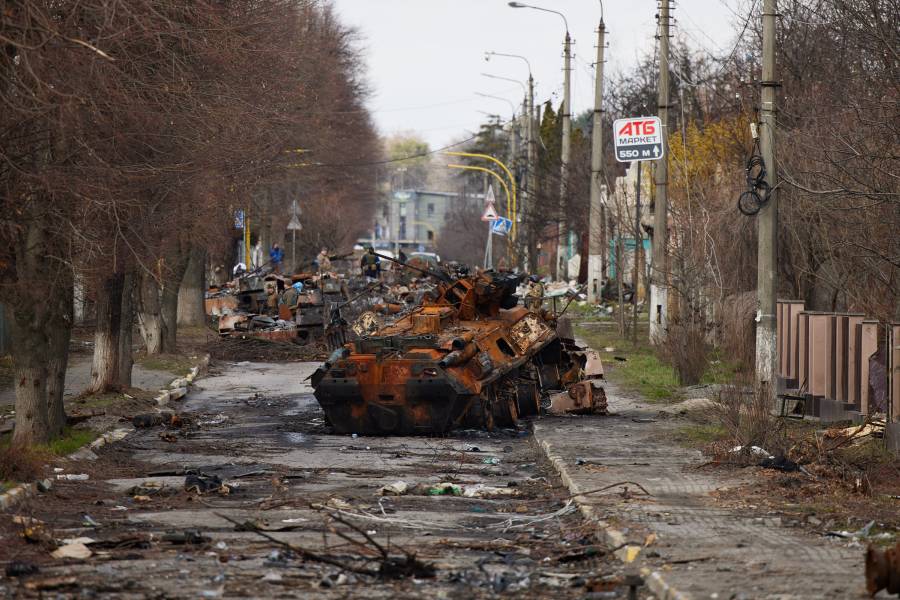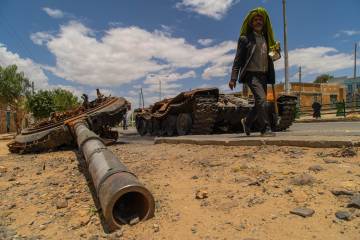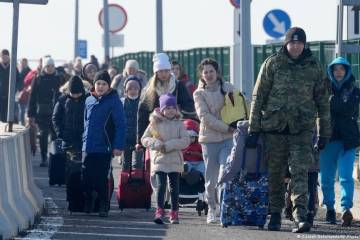- Name
- Johns Hopkins Media Relations
- jhunews@jhu.edu
- Office phone
- 443-997-9009
The geopolitical impacts of Russia's war on Ukraine rippled further this week, with Sweden and Finland's requests to join NATO—potentially breaking decades of neutrality for those countries and adding a complex new layer to Europe's political and defense landscape.
"This is a hugely significant development, and it simply would not be happening if Putin had not invaded Ukraine," said Mary Elise Sarotte, an international relations historian at the Johns Hopkins School of Advanced International Studies, during a virtual event Tuesday. "It's significant politically, it's hugely significant militarily, and it's significant in terms of the message it sends."
For one, the Baltic states would have better protection against potential Russian aggression, Sarotte said. "As you add Finland and Sweden, suddenly you turn the Baltic Sea into a NATO lake. … The Baltics start to look like defensible territory."
Meanwhile, "the European pillar of NATO" appears to be strengthening independently of the United States, according to European Union expert Nicolas Jabko, an associate professor of political science in the Krieger School. "EU leaders are now coming up with new initiatives for beefing up the European foreign policy and defense dimension," he said. "And that may be the new horizon of Europe's integration for years to come."
Tuesday's virtual briefing gathered experts from Johns Hopkins to discuss different dimensions of the ongoing war—video of the full event is available online. More highlights are below.
An ongoing humanitarian crisis
Paul Spiegel, director of the Johns Hopkins Center for Humanitarian Health, returned from Europe recently after spending more than six weeks serving on a World Health Organization team as emergency coordinator for the Ukrainian refugee crisis. A lack of accurate data on the crisis, he said, is hindering aid efforts. "We were expecting to receive a lot of data, to be able to better direct a humanitarian emergency. Whether the data is not being shared, or whether the data is unavailable, it's hard to know," Spiegel said. Responders are turning instead to "more internet, web data, [and] data scratching."
At latest count, more than 6 million Ukrainians have now fled their country—primarily women and children, with many men left behind to fight. The European Union for the first time has invoked its temporary protective directive, allowing those fleeing Ukraine access to education, banking, and employment, among other rights.
Spiegel expressed concerns about the long-term reality for Ukrainian refugees, many of whom are housed in hotels, dormitories, or with host families—arrangements intended as temporary. "As people are no longer able to host … what will happen, where will they go, and how will that affect the future of this crisis and the tensions within the countries that are accepting them?"
Growing food insecurity
A war between two countries is now impacting the food supply of the entire world, according to Jessica Fanzo, a Bloomberg Distinguished Professor of global food policy and ethics. Russia and Ukraine produce 30% of the world's wheat, along with other commodities including safflower oil and agricultural fertilizer. With both countries engaged in this conflict, global exports have become disrupted. In addition, at least 16 countries have recently issued export bans on staple commodities, Fanzo said, including India, the world's second-largest producer of wheat.
With these factors adding to COVID-19's disruption of supply chains, the United Nations estimates that 13 million people could be pushed into undernourishment, including the eight million who already fall into that category.
The war has highlighted the fundamental flaws of our global agricultural systems, according to Fanzo, especially the exaggerated dominance of rice, corn, and wheat. "We have a real homogenization of our agriculture system that puts us at huge risk when we think about climate and we think about conflicts," she said. Any solutions would require shifting funding away from these three crops, she said, "towards a whole variety of foods, fruits, vegetables, nuts, legumes, [and] other staple crops."
Shaking up Europe
Vladimir Putin's Russia has extensively interfered in European politics for years, including funding right-wing nationalists and supporting their ideological battles against the EU and NATO, said Jabko, who specializes in political economy and European politics. But reports of Russian war crimes have now stained the reputations of some European politicians seen as allies to Putin, he said, and the war has splintered the far-right nationalist movement between anti-Russians and pro-Russians.
"To have this division between different nationalists matters for the EU," Jabko said. "It makes the more centrist politicians more powerful."
Though Ukraine's prospects of joining NATO have been treated as a non-starter, Jabko sees an alternate road—for Ukraine to join the European Union, as President Volodymyr Zelenskyy has requested—as "very likely." However, that process would be complicated and lengthy. "That means that the prospect of admitting Ukraine to the EU is not for tomorrow, and it's not for the day after tomorrow," he said.
How this ends
The U.S. should consider bridge-building with Russia, because even a tense relationship with Russia is preferable to none at all, suggested Sarotte, who is a Cold War scholar and expert on Western relations with Russia. "One of the things that's really frightening to me now is just how little dialogue there is," she said, with bare-bones diplomatic staff on both sides and most arms control agreements now extinct. "In other words, the world's two most powerful countries, in military terms, are operating essentially in isolation of each other. And just that alone is dangerous because a mistake could really spiral out of control," she said.
The war may persist as a "frozen conflict" for years to come, Sarotte predicted, with Russia taking de facto control of more of the eastern regions between Ukraine and Crimea, but Ukraine existing as an independent nation.
Of all the scenarios—which could include the use of chemical, biological, or nuclear weapons—this type of prolonged stalemate could be the best outcome comparatively, she said. "Perhaps there's an end game [that] would at least be acceptable to Putin, and we can back down from this level of intense violence and atrocity that we're seeing."
Posted in Voices+Opinion, Politics+Society
Tagged jessica fanzo, ukraine, paul spiegel, ukraine conflict, nicolas jabko, mary elise sarotte










